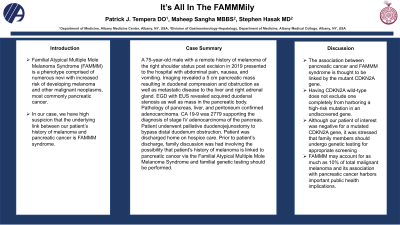Sunday Poster Session
Category: Biliary/Pancreas
P0144 - It’s All in the FAMMMily
Sunday, October 22, 2023
3:30 PM - 7:00 PM PT
Location: Exhibit Hall

Has Audio

Patrick Tempera, DO
Albany Medical Center
Albany, NY
Presenting Author(s)
Patrick Tempera, DO1, Maheep Sangha, MBBS1, Stephen Hasak, MD, MPH2
1Albany Medical Center, Albany, NY; 2Albany Medical College, Albany, NY
Introduction: Familial Atypical Multiple Mole Melanoma Syndrome (FAMMM) is a phenotype comprised of numerous nevi with increased risk of developing melanoma and other malignant neoplasms, most commonly pancreatic cancer. In our case, we have high suspicion that the underlying link between our patient’s history of melanoma and pancreatic cancer is FAMMM syndrome.
Case Description/Methods: A 75-year-old male with a remote history of melanoma of the right shoulder status post excision in 2019 presented to the hospital with abdominal pain, nausea, and vomiting. Imaging revealed a 5 cm pancreatic mass resulting in duodenal compression and obstruction as well as metastatic disease to the liver and right adrenal gland. EGD with EUS revealed acquired duodenal stenosis as well as mass in the pancreatic body. Pathology of pancreas, liver, and peritoneum confirmed adenocarcinoma. CA 19-9 was 2779 supporting the diagnosis of stage IV adenocarcinoma of the pancreas. Patient underwent palliative duodenojejunostomy to bypass distal duodenum obstruction. Patient was discharged home on hospice care. Prior to patient’s discharge, family discussion was had involving the possibility that patient’s history of melanoma is linked to pancreatic cancer via the Familial Atypical Multiple Mole Melanoma Syndrome and familial genetic testing should be performed.
Discussion: Documenting a thorough history of cancer, particularly melanoma, is of utmost importance as it is the critical element of FAMMM syndrome. The association between pancreatic cancer and FAMMM syndrome is thought to be linked by the mutant CDKN2A gene. However, having CDKN2A wild-type does not exclude one completely from harboring a high-risk mutation in an undiscovered gene. In those suspected of having FAMMM, careful examination should be performed not only on the patient of interest, but also their first- and second-degree relatives. Although our patient of interest was negative for a mutated CDKN2A gene, it was stressed that family members should undergo genetic testing for appropriate screening as having negative CDKN2A mutation is still a possibility in FAMMM syndrome. FAMMM may account for as much as 10% of total malignant melanoma and its association with pancreatic cancer harbors important public health implications. This entity should be recognized by all clinicians so appropriate screening can be performed.
Disclosures:
Patrick Tempera, DO1, Maheep Sangha, MBBS1, Stephen Hasak, MD, MPH2. P0144 - It’s All in the FAMMMily, ACG 2023 Annual Scientific Meeting Abstracts. Vancouver, BC, Canada: American College of Gastroenterology.
1Albany Medical Center, Albany, NY; 2Albany Medical College, Albany, NY
Introduction: Familial Atypical Multiple Mole Melanoma Syndrome (FAMMM) is a phenotype comprised of numerous nevi with increased risk of developing melanoma and other malignant neoplasms, most commonly pancreatic cancer. In our case, we have high suspicion that the underlying link between our patient’s history of melanoma and pancreatic cancer is FAMMM syndrome.
Case Description/Methods: A 75-year-old male with a remote history of melanoma of the right shoulder status post excision in 2019 presented to the hospital with abdominal pain, nausea, and vomiting. Imaging revealed a 5 cm pancreatic mass resulting in duodenal compression and obstruction as well as metastatic disease to the liver and right adrenal gland. EGD with EUS revealed acquired duodenal stenosis as well as mass in the pancreatic body. Pathology of pancreas, liver, and peritoneum confirmed adenocarcinoma. CA 19-9 was 2779 supporting the diagnosis of stage IV adenocarcinoma of the pancreas. Patient underwent palliative duodenojejunostomy to bypass distal duodenum obstruction. Patient was discharged home on hospice care. Prior to patient’s discharge, family discussion was had involving the possibility that patient’s history of melanoma is linked to pancreatic cancer via the Familial Atypical Multiple Mole Melanoma Syndrome and familial genetic testing should be performed.
Discussion: Documenting a thorough history of cancer, particularly melanoma, is of utmost importance as it is the critical element of FAMMM syndrome. The association between pancreatic cancer and FAMMM syndrome is thought to be linked by the mutant CDKN2A gene. However, having CDKN2A wild-type does not exclude one completely from harboring a high-risk mutation in an undiscovered gene. In those suspected of having FAMMM, careful examination should be performed not only on the patient of interest, but also their first- and second-degree relatives. Although our patient of interest was negative for a mutated CDKN2A gene, it was stressed that family members should undergo genetic testing for appropriate screening as having negative CDKN2A mutation is still a possibility in FAMMM syndrome. FAMMM may account for as much as 10% of total malignant melanoma and its association with pancreatic cancer harbors important public health implications. This entity should be recognized by all clinicians so appropriate screening can be performed.
Disclosures:
Patrick Tempera indicated no relevant financial relationships.
Maheep Sangha indicated no relevant financial relationships.
Stephen Hasak indicated no relevant financial relationships.
Patrick Tempera, DO1, Maheep Sangha, MBBS1, Stephen Hasak, MD, MPH2. P0144 - It’s All in the FAMMMily, ACG 2023 Annual Scientific Meeting Abstracts. Vancouver, BC, Canada: American College of Gastroenterology.
